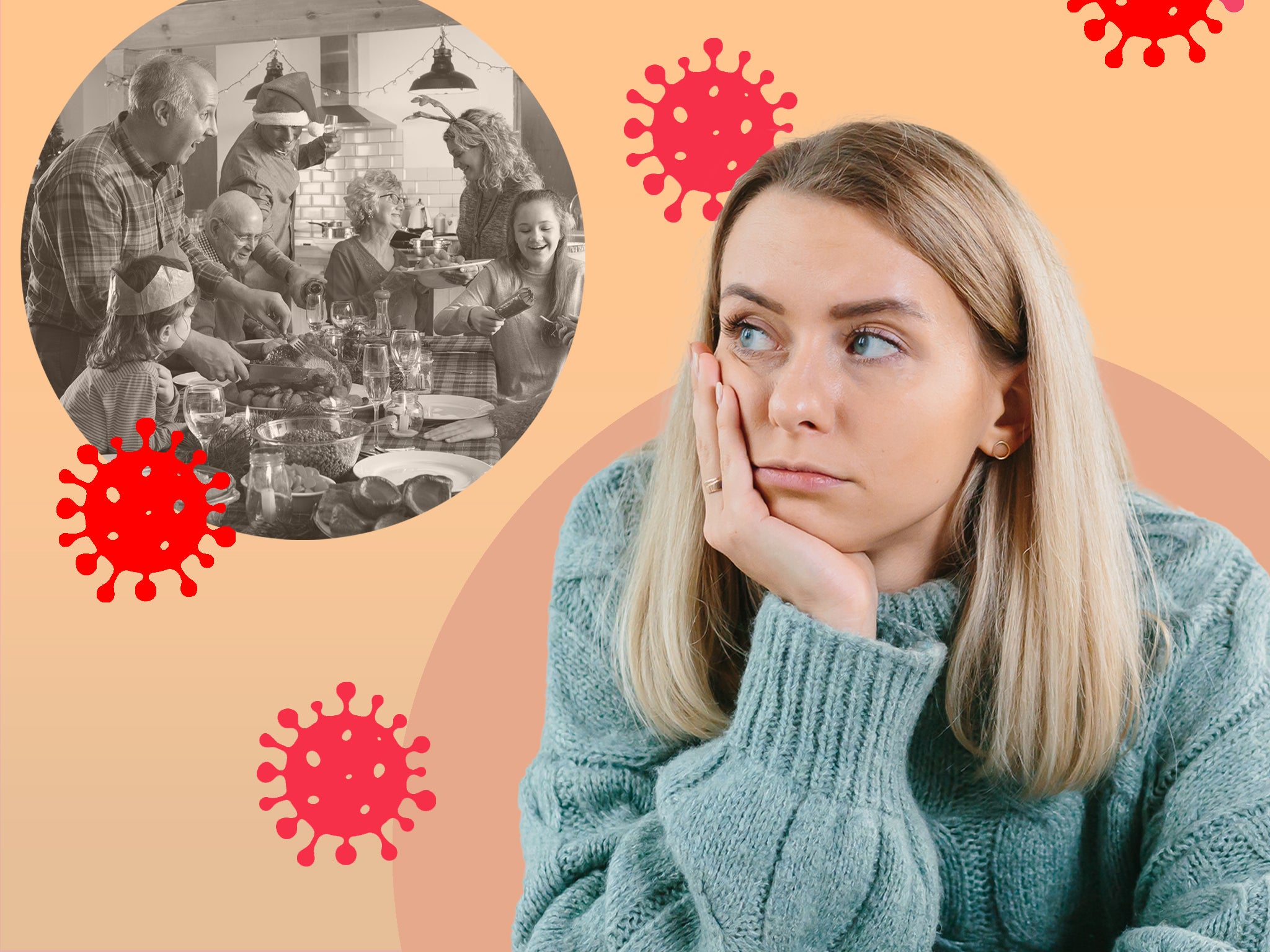How to deal with unvaccinated family members at Christmas
As omicron cases continue to surge across the UK, Olivia Petter explains how to navigate the festive period if you’re spending it with unvaccinated family members


Tis the season, but, once again, things are looking a little different this year. The new coronavirus variant, omicron, is continuing to spread rapidly around the UK. And now, it has been revealed that more than a million people are likely to be isolating with Covid-19 on Christmas Day.
Meanwhile, on Friday 17 December, the UK reported its highest number of daily coronavirus infections since the pandemic began, estimated at 93,000. Hardly the most wonderful time of year.
There is some good news though, with recent research claiming that two doses of Pfizer’s Covid-19 vaccine offered 70 per cent protection against hospitalisation with omicron and 33 per cent protection against infection.
Meanwhile, early tests suggest that the Pfizer booster jab can also offer protection against omicron variant.
The government website also states that getting fully vaccinated is the best way of protecting you and others against Covid-19.
Despite this, recent reports claim that many people in the UK remain unvaccinated, with as many as one third of Londoners not having received any doses of the vaccine against coronavirus.
In light of this, it’s possible that when family members unite for Christmas - if none of them are self-isolating, that is - that some of them might well be unvaccinated.
This could be an anxiety inducing scenario for countless reasons, namely that mixing with unvaccinated people could mean you’re 20 times more likely to catch coronavirus, according to one study.
But how do you broach the subject with your unvaccinated family members? And what if they’re asking to spend the night at your home over Christmas? And is there any way of having these conversations without causing a big bust-up at the dining table?
“Spending time with family members over Christmas can be a stressful event at the best of times,” notes Relate counsellor Holly Roberts. “But add in the fact that most of us spent Christmas apart from family last year and there are additional Covid considerations to be made, it sets the scene for a more pressurised environment than usual.
“This may prime us for heated discussions with family members around being unvaccinated. Being aware of this is a good place to start when the festivities begin.”
Roberts points out that having any disagreement with a family member is difficult, but that the issue of vaccinations is a particularly tough one to broach.
“Think about how you might approach this subject in advance of Christmas,” she suggests. “This will give you time to prepare your thoughts and feelings and help you free more able to manage emotionally if conflict arises.”
It might also be worth considering how you usually approach conflict, and how it affects you. What triggers you, for example, to get angry? “If you can identify these in advance, you are more likely to be able to hold your cool during a tricky conversation, at the same time as expressing yourself authentically,” says Roberts.
It’s also worth recognising that jumping to conclusions might not be the best way to get through to someone when it comes to discussing vaccinations.
“Try to be curious and listen to what the other person is saying without judgement,” says Roberts. “The hope is that if you model this way of being, they will be more open to you too.”
When it comes to actually engaging in a disagreement, Roberts suggests trying to make sure you don’t lead the other person to believe they are completely wrong as this will only lead to defensiveness and further arguing.
“Think about what points you want to express, as there are bound to be really important things you want to say on this matter,” she advises. “Feel confident that your opinion counts, despite hearing information that will contradict this. You can then feel like you’ve expressed yourself in a completely genuine way.”
You also need to recognise the importance of timing. For example, starting a heated discussion about vaccines while everyone is already three gin and tonics-deep probably isn’t going to be productive.
“And if a conversation does start to turn sour, recognise that it’s a good time to stop as nothing productive will come from any more talking, and it may only lead to a big argument,” she adds.
Set boundaries, too, and don’t be afraid to end the conversation if you feel like lines are being crossed.
“Putting a stop to an emotive argument is much better than trying to plough on with it because the effect it has on you may tarnish the rest of your time with your family over the festive period,” Roberts says.
Health advice on navigating Christmas with unvaccinated family members.
Ask everyone to wear masks
“If you decide you have to invite unvaccinated relatives, have everyone wear masks,” advises George Rutherford, professor of epidemiology at the University of California, San Francisco.
“Masks can be worn safely by children over two,” he adds.
In England and Wales, face coverings have been required by law in most indoor public places and on public transport, including taxis, since 10 December. But wearing them while gathering over Christmas with unvaccinated family members could be a good idea for extra protection.
The government website states that the best available scientific evidence is that, when used correctly, wearing a face covering may reduce the spread of coronavirus droplets, helping to protect everyone.
Ask guests to take a lateral flow test beforehand
This is becoming standard for social occasions, but Rutherford suggests it’s particularly important to ask your unvaccinated guests to get tested before coming into your home this Christmas.
It’s crucial because, as the government states, around one in three people with Covid-19 do not have any symptoms. This means they could be spreading the virus without knowing it.
“Testing regularly increases the chances of detecting Covid-19 when you are infectious but are not displaying symptoms, helping to make sure you do not spread Covid-19 by staying at home and self-isolating immediately,” it adds.
Try to limit the number of households
“If at all possible, have smaller events that don’t bring as many households together,” advises Rutherford.
Currently, there are no restrictions in England and Wales regarding how many households can mix over the festive period.
However, choosing to limit the number of people in attendance at your family gathering this Christmas could be particularly beneficial when it comes to reducing the spread of Covid-19, especially if unvaccinated people are in attendance.
As the government website explains: “When someone with Covid-19 breathes, speaks, coughs or sneezes, they release particles containing the virus that causes Covid-19. These particles can be breathed in by another person.”
If possible, host events outdoors (or with plenty of ventilation)
This will be a tricky one for anyone living in the UK, but Rutherford advises hosting events outdoors if possible to avoid transmission.
“Meeting outdoors vastly reduces the risk of airborne transmission, but this may not always be possible,” states the government website.
“If you’re indoors, you should let fresh air in to reduce the risk of catching or spreading Covid-19.”
Bookmark popover
Removed from bookmarks